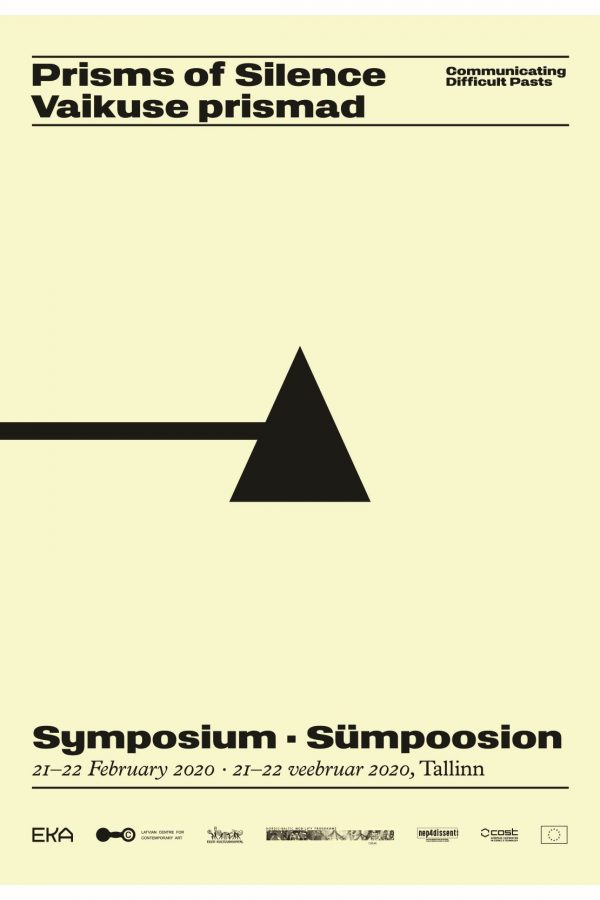
EKA, Põhja pst 7, Tallinn
Start Date:
21.02.2020
End Date:
22.02.2020
On February 21–22, 2020, the Estonian Academy of Arts will host an international symposium titled “Prisms of Silence”. The symposium seeks to analyse and understand the prisms through which we could meaningfully reconsider significant silences. A particular interest lies in rethinking the silences about WWII, its aftermath and the Soviet era in order to explore how they could offer productive ways of understanding present social change. The main organizers of the symposium are Dr Margaret Tali at the Institute of Art History and Visual Culture at the Estonian Academy of Arts, and Ieva Astahovska at the Latvian Centre for Contemporary Art. The symposium is a part of the collaborative project “Communicating Difficult Pasts” between the Institute of Art History and Visual Culture at EAA and the LCCA. The participants include humanities scholars, curators and artists: see the CFP.
“PRISMS OF SILENCE” SYMPOSIUM PROGRAM
Venue: Room A501, Estonian Academy of Arts,
Põhja puiestee 7, Tallinn
DAY 1: FRIDAY, 21 FEBRUARY 2020
9:00 – 9:10 Welcome by Mart Kalm, Rector of the Estonian Academy of Arts
9:10 – 9:30 Introduction to the Symposium by Margaret Tali and Ieva Astahovska
9:30 – 11:00 Session 1: Absences, their Impacts and Memory Work, Moderated by Violeta Davoliūtė, Vilnius University
Asja Mandić, Suppression of Socialist Narratives of the Second World War and its Modes of Visual Representation
Annika Toots, Exhibition Displaced Time: 10 Photographs from Restricted Collections as a Model of Remembrance
Jan Miklas-Frankowski, A City of Amnesia: Marcin Kącki’s Białystok. White Power. Black Memory
11:00 – 11:30 Coffee break
11:30 – 13:00 Session 2: Difficult Knowledge and Artistic Interventions, Moderated by Ieva Astahovska
Margaret Tali, Thinking through Silence and Mental Health in Recent Documentary Film
Zuzanna Hertzberg, Nomadic Memory: Artivism as Everyday Feminist Antifascist Practice
Rasa Goštautaitė, Contested Soviet Legacy: The Case of the Petras Cvirka Monument in Vilnius, Lithuania
13:00 – 14:00 Lunch break
14:30 – 16:00 Guided tour in the Vabamu Museum, Toompea 8 (1,5 h)
16:30 – 18:30 Session 3: When Sources Fail: Visual Languages for Analysing Past Trauma, Moderated by Margaret Tali
Assel Kadyrkhanova, Image, Sound, Absence, Silence. Artmaking on Historical Trauma
Lia Dostlieva, “I still feel sorry when I throw away food – Grandma used to tell me stories about the Holodomor.”
Kai Ziegner, A History of Violence
Aslan Goisum, Realms of Memory and Sources of Resistance
18:30 – 19:30 Dinner
9:30 – 10:15 Short keynote by Giedrė Jankevičiūtė, Reconstruction of Contested History: Vilnius, 1939-1949, Introduced by Margaret Tali
10:15 – 11:45 Session 4: The Unspeakable and Agency, Moderated by Eneken Laanes, Tallinn University
Katrina Black, Absence as Form: Spaces of Articulation in the Work of Chantal Akerman
Kati Roover, Project Red
Jaana Kokko, Oral History and Moving Image
11:45 – 12:15 Coffee break
12.15 – 13.45 Session 5: Patterns of Muting and Silencing, Moderated by Siobhan Kattago, University of Tartu
Franziska Link, Brawling Silences. Rereading Louis-Ferdinand Céline’s Écrits Maudits
Mischa Twitchin, Refracting Implication: The Uses of Silence
Jan Matonoha, Dispositives of Silence: Injurious Attachments and Discursive Emergence of Silencing; “Missing” Gender in Czech Dissent Samizdat and Exile Literature
13:45 – 14:45 Lunch break
14:45 – 16:15 Session 6: Breaking Silences and Challenges to Changing Discourses, Moderated by Ilya Lensky, Director of the Museum “Jews in Latvia”
Shelley Hornstein, Architecture’s Dirty Little Secrets
Ieva Astahovska, On Collaborations, Silences and Lustration
Maayan Raveh, The Implication of Silence – The Promised Land in Palestinian Christian Theology
16:15 – 16:45 Coffee break
16:45 – 18:15 Session 7: There and Not There – Ways of Giving Voice to the Past, Moderated by Pille Runnel, Head of Research at Estonian National Museum
Elina Niiranen, Finnish Linguist Pertti Virtaranta and Silenced Identity of Karelians in the 1960’s Soviet Karelia
Paulina Pukytė, Repetition of Silence
Elisabeth Kovtiak, (Non-)sites of Memory of the Holocaust in Belarus: Cases of Minsk and Brest
18:15 – 18:45 Final discussion and conclusions
19:00 – 20:00 Dinner
Supporters of the symposium:
EKA LOOVKÄRG – Eesti visuaal- ja ruumikultuuri õppe- ja
teaduskeskus (Sisutegevuste projekt)
2014-2020.4.01.16-0045
Nordic Culture Point
Cultural Endowment of Estonia
EKA research fund
NEP4DISSENT: COST Action 16213
